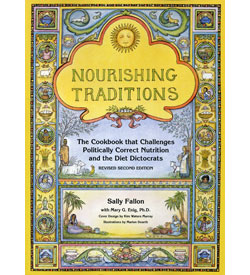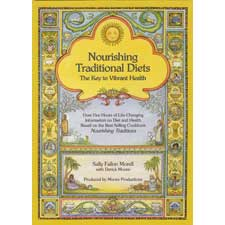Thanks to the work of Weston Price and the healthy, nonindustrialized peoples he studied, we can understand the importance of eating nutrient dense whole foods. Although these nonindustrialized people had an innate understanding of which foods to eat and how to prepare them in the most healthful ways, modern society has lost this instinct.
The Principles of Healthy Traditional Diets
- The diets of healthy, nonindustrialized peoples contain no refined or denatured foods such as
- refined sugar or corn syrup
- white flour
- canned foods
- pasteurized, homogenized, skim or low fat milk
- refined or hydrogenated vegetable oils
- synthetic vitamins
- toxic additives and colorings
2. All traditional cultures consume some sort of animal food such as
- fish or other seafood
- land and water fowl
- land and sea mammals
- eggs
- milk and milk products
- reptiles
- insects
The whole animal was consumed- muscle meat, organs, bones and fat.
3. The diets of healthy, nonindustrialized peoples contain at least four times the minerals and water-soluble vitamins, and ten times the fat-soluble vitamins found in animal fat (vitamin A, vitamin D and Activator X) as the average American diet.
4. All traditional cultures cooked some of their food, but all consumed a portion of their animal food raw.
5. Primitive and traditional diets have a high food enzyme content from
- raw dairy products
- raw meat and fish
- raw honey
- tropical fruits
- cold-pressed oils
- wine and unpasteurized beer
- naturally preserved, lacto-fermented vegetables, fruits, beverages, dairy products, meats and condiments
6. Seeds, grains and nuts are soaked, sprouted, fermented or naturally leavened to neutralize naturally occurring anti-nutrients such as enzyme inhibitors, tannins and phytic acid.
7. Total fat content of traditional diets varies from 30% to 80% of calories, but only 4% of calories come from polyunsaturated oils naturally occurring in grains, legumes, nuts, fish, animal fats and vegetables. The balance of fat calories is in the form of saturated and monosaturated fatty acids.
8. Traditional diets contain nearly equal amounts of omega-6 and omaga-3 essential fatty acids.
9. All traditional diets contain some salt.
10. All traditional cultures make use of animal bones, usually in the form of gelatin-rich bone broths.
11. Traditional cultures make provisions for the health of future generations by providing special nutrient-rich animal foods for parents-to-be, pregnant women and growing children. Proper spacing of children, as well as teaching the principles of healthy diet to the young is included in these provisions.
The Weston A. Price Foundation has local chapters, which can help you find quality produce and pasture raised meats and dairy products in your community. We encourage you to become a member! The books, DVDs and CD below are excellent resources to learn more about nourishing traditional diets. Many thanks to Dr. Price, Sally Fallon and Mary Enig for their tireless efforts to promote these teachings.
Wishing you and your family vibrant health for generations to come!
 |
 |
 |
 |
 |
 |
